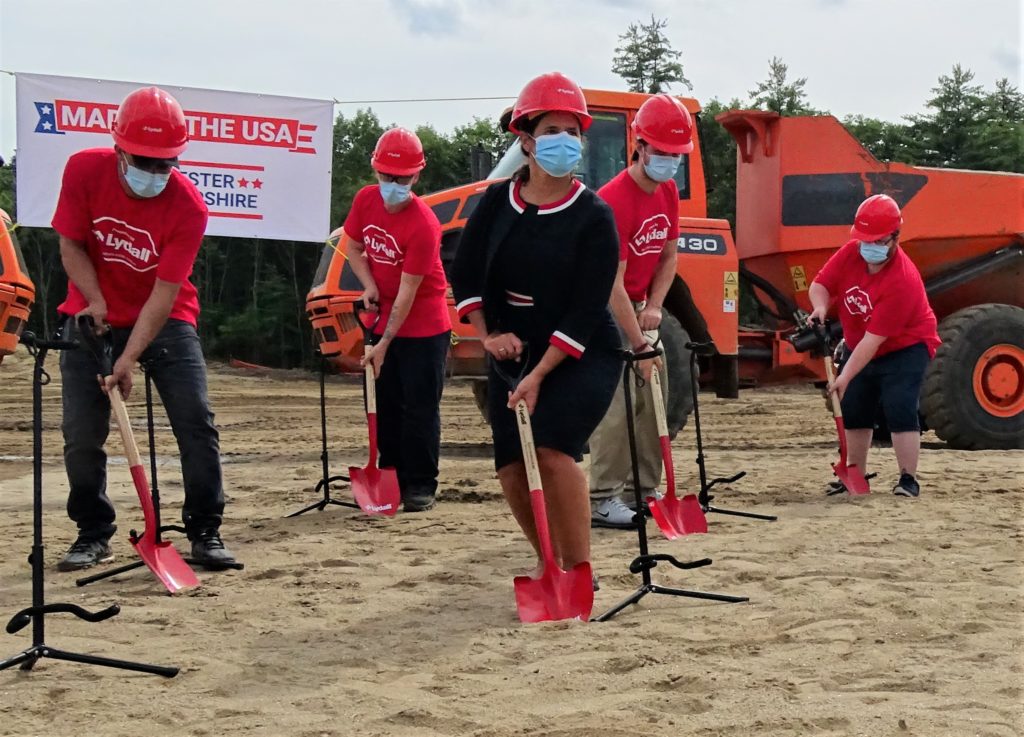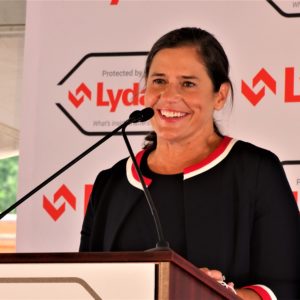At a groundbreaking ceremony at their facility in Rochester, N.H., the CEO of Lydall said COVID-19 has been a wake-up call for government officials and healthcare providers in the United States on the need to produce personal protective (PPE) equipment domestically to ensure the safety of healthcare workers and first responders.
“There are many masks being tested as they are coming into the country that aren’t meeting the standards, which is just reinforcing why we need to make sure that we have a supply chain that we can trust because the media that Lydall makes and the mask makers we sell to all comply with the highest regulations that exist,” Sara Greenstein told InsideSources.
Greenstein spoke with the press after an event to both announce their new production capacity and recognize the sacrifice of their workers during the COVID-19 pandemic. Lydall worked 60 straight days with no time off to produce meltblown filtration media for N95 respirators and surgical masks.
Meltblown filtration media makes up the inside layer of N95 respirators and surgical masks. It traps viruses, bacteria, dust and other harmful particles.
The new facility can create materials needed for the production of 140 million N95 respirators or 540 million surgical masks per month, and it is expected to be completed by May of next year.

A groundbreaking ceremony at the Lydall facility in Rochester, NH on July 24, 2020 (Kimberly Haas)
Lydall officials signed a $13.5 million contract with the U.S. Department of Defense last month to support their investment into the expansion, which includes two new production lines and a center of excellence.
Geoff Crosby is helping oversee the expansion and said they ship their meltblown filtration media directly to the companies which manufacture the masks. They take extra precautions to make sure counterfeiters do not dupe their customers.
“You can have counterfeiters, that is possible, we’ve seen that in third world countries where people have either stolen old boxes of ours or make boxes look like Lydall material. With every shipment we do our best to label and track to our customers,” Crosby said.
Officials at the United Nations Office on Drugs and Crime reports that the sudden increase in demand for medical products to address the COVID-19 pandemic has led to an expansion in the trafficking of substandard and falsified products. In some cases, the orders are paid for but never filled. In others, substandard materials are passed off as legitimate.
In one case, a Silicon Valley investor paid workers $20 an hour to take millions of dollars of Chinese-made non-medical masks and re-package them as medically certified KN95 PPE.
UNODC Executive Director Ghada Waly said in a statement that criminals exploiting the COVID-19 crisis are putting lives at risk.
“Transnational organized crime groups take advantage of gaps in national regulation and oversight to peddle substandard and falsified medical products. We need to help countries increase cooperation to close gaps, build law enforcement and criminal justice capacity, and drive public awareness to keep people safe,” Waly said.
Philip Morris International Inc. , the U.S. Chamber of Commerce and Procter & Gamble have organized a response, raising awareness of the international trade in fraudulent PPE.
When the two new production lines are up and running in Rochester, Lydall’s products will be distributed to manufacturers in North America. The company is positioning itself to be the single largest site for meltblown filtration media on the continent and arguably the world.
Lydall’s engineers are also working on new innovations for commercial HVAC systems to help prevent the spread of airborne diseases. They produce MERV-, HEPA-, and ULPA-grade air filtration systems.
Lydall currently has about 3,300 employees worldwide.

